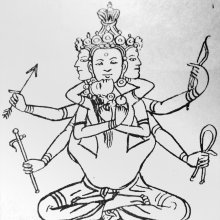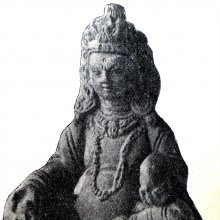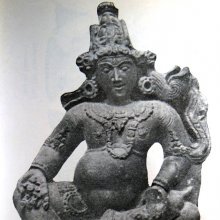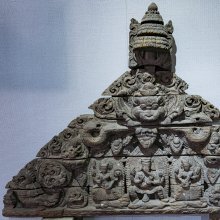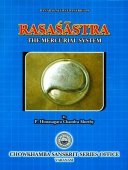Arc: 8 definitions
Introduction:
Arc means something in Hinduism, Sanskrit. If you want to know the exact meaning, history, etymology or English translation of this term then check out the descriptions on this page. Add your comment or reference to a book if you want to contribute to this summary article.
Alternative spellings of this word include Arch.
Images (photo gallery)
Languages of India and abroad
Sanskrit dictionary
Source: DDSA: The practical Sanskrit-English dictionaryArc (अर्च्).—1 U. (arcati-te, ānarca, ārcit, arcituma, arcita)
1) (a) To adore worship, salute, welcome with respect; प्रणम्य चानर्च विशालमस्याः शृङ्गान्तरं द्वारमिवार्थसिद्धेः (praṇamya cānarca viśālamasyāḥ śṛṅgāntaraṃ dvāramivārthasiddheḥ) R.2.21, 1.6,9;4.84,12.89; Manusmṛti 3.93; आर्चिद् द्विजातीन् परमार्थविन्दान् (ārcid dvijātīn paramārthavindān) Bhaṭṭikāvya 1.15,14.63;17.5; यस्यार्चत्यसौ शासनम् (yasyārcatyasau śāsanam) Mv.1.29 honours, respectfully obeys. (b) To honour, i. e. decorate, adorn; स्वकुसुमैरर्चन्ति गोदावरीम् (svakusumairarcanti godāvarīm) Uttararāmacarita 2.9.
2) To praise (Ved.)
3) To shine. 1 P. or Caus.
1) To honour, adore, worhip; स्वर्गौकसामर्चितमर्चयित्वा (svargaukasāmarcitamarcayitvā) Kumārasambhava 1.59.
2) To praise.
3) To cause to shine; हर्यन्नुषसमर्चयः (haryannuṣasamarcayaḥ) Ṛgveda 3.44.2. -Desid. [अर्चिचिषति (arciciṣati)] To wish to worship; -With [anu] to congratulate, hail with joy.
-pra 1 to praise, sing praises of.
2) to honour, worship; प्रानर्चुरर्च्या जगदर्चनीयम् (prānarcurarcyā jagadarcanīyam) Bhaṭṭikāvya 2.2; -caus. to honour.
-sam 1 to worship, adore.
2) to fix, settle, establish.
Source: Cologne Digital Sanskrit Dictionaries: Shabda-Sagara Sanskrit-English DictionaryArc (अर्च्).—[arca] r. 1st cl. (arcati) Also 1st and 10th cls. (arcati-te arcayati-te) To worship, to honour or treat with respect: with sam prefixed, to worship. This root and its derivatives are also read arcca, &c. doubling the consonant after ra.
Source: Cologne Digital Sanskrit Dictionaries: Benfey Sanskrit-English DictionaryArc (अर्च्).—i. 1 and 10, [Parasmaipada.] and [Ātmanepada.] 1. To beam,
— With the prep. abhi abhi, To worship, [Mānavadharmaśāstra] 8, 391. abhyarcita, with gen. [Rājataraṅgiṇī] 5, 101.
— With samabhi sam-abhi, To worship, Yājñ, 1, 179.
— With prati prati, Causal. To return a respectful salutation, with acc. [Rāmāyaṇa] 2, 71, 31.
— With sama sam, To honour, [Rāmāyaṇa] 2, 3, 48.
Source: Cologne Digital Sanskrit Dictionaries: Monier-Williams Sanskrit-English Dictionary1) Arc (अर्च्):—1. arc [class] 1. [Parasmaipada] arcati ([subjunctive] arcāt [imperfect tense] ārcat; [Aorist] ārcīt, [Bhaṭṭi-kāvya], perf. ānarca 3. [plural] ānarcuḥ [Mahābhārata iii, 988, etc.], but [Vedic or Veda] ānṛcuḥ [Ṛg-veda]; perf. [Ātmanepada] ([Passive voice]) ānarce [Bhaṭṭi-kāvya], but [Vedic or Veda] sam ānṛce [Ṛg-veda i, 160, 4]; [future] p. arciṣyat [Manu-smṛti iv, 251]. [indeclinable participle], arcya [Manu-smṛti] etc.; cf. [Pāṇini 7-1, 38] [Scholiast or Commentator] or arcitvā [Rāmāyaṇa iii, 77, 15], [Vedic or Veda] [Infinitive mood] ṛcase [Ṛg-veda vi, 39, 5 and vii, 61, 6]) to shine, be brilliant, [Ṛg-veda];
—to praise, sing (also used of the roaring of the Maruts, and of a bull [Ṛg-veda iv, 16, 3]), [Ṛg-veda; Atharva-veda; Śatapatha-brāhmaṇa], to praise anything to another ([dative case]), recommend, [Ṛg-veda];
—to honour or treat with respect, [Mahābhārata] etc.;
—to adorn, [Varāha-mihira’s Bṛhat-saṃhitā] : exceptionally [Ātmanepada] (1. [plural] arcāmahe)
—to honour, [Mahābhārata ii, 1383]:
—[Causal] (2. sg. arcayas) to cause to shine, [Ṛg-veda iii, 44, 2.] [Ātmanepada] [Parasmaipada] to honour or treat with respect, [Manu-smṛti; Mahābhārata] etc.:
—[Desiderative] arciciṣati, to wish to honour, [Pāṇini 6-1, 3 [Scholiast or Commentator]] [Vedic or Veda] [Passive voice] ṛcyate (p. ṛcyamāna)
—to be praised, [Ṛg-veda]
2) 2. arc m. ([instrumental case] arcā) fn. shining, brilliant ([Grassmann]), [Ṛg-veda vi, 34, 4.]
Source: Cologne Digital Sanskrit Dictionaries: Yates Sanskrit-English DictionaryArc (अर्च्):—arcati te 1. c. To worship.
Source: DDSA: Paia-sadda-mahannavo; a comprehensive Prakrit Hindi dictionary (S)Arc (अर्च्) in the Sanskrit language is related to the Prakrit word: Acca.
[Sanskrit to German]
Sanskrit, also spelled संस्कृतम् (saṃskṛtam), is an ancient language of India commonly seen as the grandmother of the Indo-European language family (even English!). Closely allied with Prakrit and Pali, Sanskrit is more exhaustive in both grammar and terms and has the most extensive collection of literature in the world, greatly surpassing its sister-languages Greek and Latin.
See also (Relevant definitions)
Starts with (+199): Arca, Arca-desha, Arcabera, Arcabhin, Arcabu, Arcaddhuma, Arcagriha, Arcaka, Arcakashabdotpatti, Arcakatva, Arcaki, Arcakridana, Arcala, Arcana, Arcana-bhoga, Arcana-vibhava-kani, Arcana-vritti, Arcanadhikara, Arcanadi, Arcanaiyati.
Ends with: Abhiprarc, Abhyarc, Anvarc, Carc, Dhanarc, Jarc, Jharc, Marc, Parc, Paryarc, Prarc, Pratyarc, Samabhyarc, Samarc, Sarc, Suryarc, Udarc, Uttararic, Varc.
Full-text (+204): Jya, Acca, Arcis, Capa, Abhyarcana, Dhanu, Arca, Uttarajya, Samasabhavana, Arcitri, Arcana, Pratyarcana, Arcitin, Dvijya, Mandalabhaga, Arcaka, Abhyarca, Abhyarcya, Arcatrya, Arcaniya.
Relevant text
Search found 81 books and stories containing Arc; (plurals include: Arcs). You can also click to the full overview containing English textual excerpts. Below are direct links for the most relevant articles:
Karmic Astrology—a Study (by Sunita Anant Chavan)
Part 2.2.3 - Study of motions of Sun and Moon < [Chapter 2 - Jyotiḥśāstra and the Concept of Karman]
Vakyapadiya of Bhartrihari (by K. A. Subramania Iyer)
Verse 3.13.31 < [Book 3 - Pada-kāṇḍa (13): Liṅga-samuddeśa (On Gender)]
Verse 3.14.51 < [Book 3 - Pada-kāṇḍa (14): Vṛtti-samuddeśa (On Ccomplex Formation)]
Verse 3.8.39 < [Book 3 - Pada-kāṇḍa (8): Kriyā-samuddeśa (On Action)]
Bonds of Indo European Culture < [October – December, 2007]
Browning and his Fugitive Vision < [January-February 1935]
Chance Visiting < [October – December, 2001]
Manusmriti with the Commentary of Medhatithi (by Ganganatha Jha)
Verse 3.8 < [Section III - Marriageable Girls]
Verse 6.60 < [Section VI - Procedure of going forth as a Wandering Mendicant]
Verse 5.29 < [Section VI - Lawful and Forbidden Meat]
Rasa Jala Nidhi, vol 4: Iatrochemistry (by Bhudeb Mookerjee)
Part 72 - Recipes of certain medicines having no minerals in them < [Chapter III - Jvaratisara fever with diarrhoea]
Part 79 - Lauha parpati < [Chapter III - Jvaratisara fever with diarrhoea]
Treatment for fever (79): Kanta rasa < [Chapter II - Fever (jvara)]
Samarangana-sutradhara (Summary) (by D. N. Shukla)
Related products

